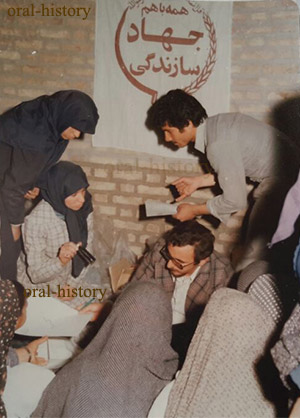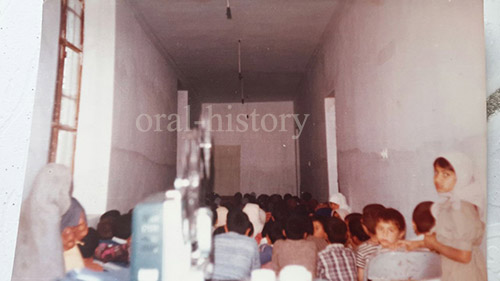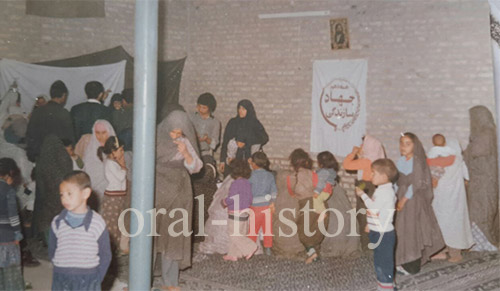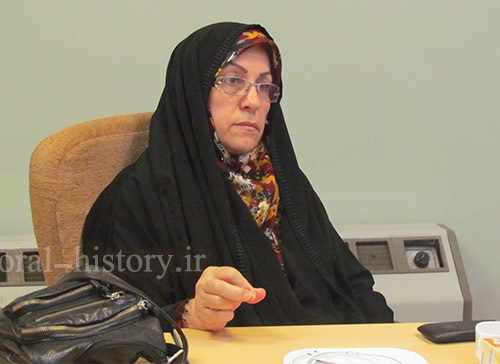Memoirs of Azam Khasterh Far from Jihad Sazandegi and relief working
A hospital inside train
Faezeh Sasanikhah
Translated by M. B. Khoshnevisan
2018-7-24
Note: After the order of Imam Khomeini (God bless his soul) for establishment of Jihad Sazandegi or the holy war of construction in June 1979, many teenagers and youths across the country started cooperating with this organization voluntarily. They carried out many services to the people of towns and villages, and made strenuous effort to remove deprivation. Providing the primary necessities of the needy, building roads for rural areas and removing developmental, health and cultural problems were among the programs of the organization. With the breakout of Saddam’s imposed war against Islamic Republic of Iran, the activity of the Jihad Sazandegi entered a new phase. A number of its members went to the war zones and started servicing.
Azam Khasteh Far is one of the girls of that time who started her cooperation with the organization since its inception and, with the breakout of the war, she went to different areas along with the Red Crescent train.
*When did you enter the Jihad Sazandegi and what did you do there?
*After the victory of the Islamic revolution, I liked to have useful and voluntary activities. I asked different people where I could work. After the setting up of the Jihad in 1979, the organization was introduced to me. At that time, the office of the Jihad was in Tehran’s Bahar Shiraz Street. We worked in a basement which was called minus sixty. We separated the collected drugs in a large hall. There was someone there who taught us how to separate the drugs. We separated antibiotics, digestive and anti-allergic drugs, and so on. We gradually learned how to separate the drugs empirically.

*Jihad Sazandegi had various committees. Why did you choose the Heath Committee?
*I loved relief working. I went there for relief working since the very beginning. I was told to separate the drugs for the beginning. After a while, we were transferred to Somayeh Street, in front of the Art Center. Then, we were introduced to Shohaday-e Tajrish Hospital for spending a relief working course.
One of our other jobs was that we referred to the doctors’ offices and collected the drugs the pharmaceutical companies had given to them for introduction. We also asked them, “If we send patients, do you accept them?” some of them accepted.
*In which part of the cities were the offices you visited?
*We referred to all parts of the city. Every day, we planned to go to one part. Some of the doctors cooperated with us, and on Thursdays and Fridays, we sent them to the areas around city from Somayeh Street.
*Who presented the plan for collecting drugs from the doctors’ offices and other plans?
*The ideas were suggested and reviewed by the members in the meetings that we held at the Jihad office and then we followed up and operated them.
*Were such plans carried out just in Tehran?
*No. The Jihad’s officials and members decided in June 1980 to go to the towns of Damavand, Varamin and Shahriyar and to service the people and the deprived. They said, “We need the persons who go to the towns and vaccinated the children and find the patients.” The Jihad’s members went to the districts such as Ghaleh Hasan Khan, Shahriyar and Radij from dawn to dusk, but in Varamin and Damavand, the forces had been deployed and stayed for a few days. Then, we went to Imam Khomeini Hospital and got admission for the patients to be cured.

I and one of my friends, Forough Zahedi went to Damavand. I had also gone to Varamin. We gathered the people in one of the mosques, and the doctor visited the patients and we as assistants did works such as dressing or injection if needed. In Damavand, we travelled to the villages and during the week, studied how many patients there were and what diseases were more there. We identified the diseases and studied the people’s problems. We sent doctors according to the needs. We took doctors such as dentists, obstetricians and so on. Some of the physicians took drugs themselves. Some of the drugs were taken from the Jihad office. In fact, we found patients and then requested for the dispatch of the related physician in order to come to Damavand on Thursdays and Fridays.
*Where had you been deployed in Damavand?
*The Jihad had been deployed in the beginning of Damavand Road in which the Committee of Development and Agriculture was active, but it did not have the Health Committee. We two launched a health center there which had both a drug store and first aids.
*Were the houses you visited built from cob?
*They were both built from cob and bricks. We went to Firouzkouh, too. Agriculture and horticulture were booming there. We went to a village in Damavand whose inhabitants were Lor (a tribe in Iran). Their uniforms were typical of their culture and tradition.
*Didn’t the bad conditions of the wounded affect negatively in your spirit?
*Yes. But we were happy that we could do something for them. Tuberculosis was very prevalent there due to dust.
*In general, how did the people of those areas welcome the Jihad Sazandegi?
*It was good. When we entered a village, they came in front of the car and welcomed us.
*What were the main problems of the people whom you visited?
*Most problems were about women and delivery and dentistry. When a tooth is infected, digestive problems would happen too.
*How was the living conditions of the villagers and how did they earn a living?
*The people of the villages earned a living through agriculture and animal husbandry. They carried out dry farming and planted wheat and barley. The People were not very poor. Damavand was a summer residence and was much better than Varamin and Gharchak. We however, were serving them.

Once, we had been sitting in the Jihad’s headquarters which they informed us that a number of students had been injured. We drove a distance by a car and walked the rest of the way in order to reach the students. The hills were too much and the car could not go. The students had been taken for harvesting by a truck, but the truck had been capsized. Many of them had been wounded and their arms and legs had been broken. It was very painful. We secured the broken arms and legs with splints and among them, one had been sent to the town for treatment.
*Did you work just in the health section of the Jihad?
*No. Alongside health services, we also did cultural works. The cultural Committee held a course of photography for us. I bought a camera with personal cost and took photos from the activities of the members of the Health Committee. I received a letter from the Jihad and took it to the Health Ministry and borrowed the films for one month. I received from the Health Ministry the training films and a movie projector and played films for rural women in a school or a mosque about how to breastfeed and to observe health. Their houses were close to their cowsheds. We taught them how to keep hygiene so that animal diseases were not transferred to them. Other than the educational videos, I also played featured films for them. I showed the film "Harmonica" in many villages. The kids liked it very much and watched the film. We did this when we did not have a doctor.
*How did the ladies welcome your programs?
*It was good. The ladies came and watched the film and asked questions if there was any ambiguity or point.
*Where were you when the war broke out?
*I and Forough Zahedi were in Damvand. After some ten days, we were told, "The priority now is for the war. Collect your belongings and return to Tehran. All facilities should be made available to the war." The forces were sent to the fronts from Tehran. We sent drugs for the fronts.
*When was your first trip with the Red Crescent train?
*I went with them for the third the Red Crescent train was being sent. I was replaced by another person. The train evacuated the injured in Arak and Isfahan and in general, traveled to the cities which had railway facilities.

*How did you satisfy your family for this trip?
*Since I was working in the Jihad and stayed in Damavand, my family had been accustomed to this absence. I also explained for them that there was a war and we were needed. My brother Mohammad Hossein who was younger than me and later was martyred in the war in Ghalavizan in 1986 backed me. My father said, "Why are the girls sent?" I said, "The women are also present. Some of them have also been injured." The family was ready that I go. It was our own revolution and we did everything to preserve it.
*How had you become familiar with the revolutionary atmosphere?
*Before the victory of the Islamic revolution, my father took part in the meetings held in the Grand Mosque of bazar where his shop was also located. We had the Resaleh or jurisprudential manual of Imam Khomeini (God bless his soul) in our home. His Resaleh was hidden in a charcoal gunny. I became familiar with the Imam since I wanted to choose a Marja' or source of emulation.
I got my diploma in 1978. Then, I worked with a physician in Mirdamad Avenue. Once, when I came out of the office, a man gave me a communique in which it had been advertised for a rally in 17th of Shahrivar or eighth of September 1978. I started my activity with my cousin; reading communiques, taking part in the rallies and listening to the tapes, and in this way, we were active in the revolution.
*What was your duty in the Red Crescent train?
The train was equipped with operation room, pharmacy, radiology, lab, and all necessary equipment. I was responsible for the delivery of pharmacy drugs. The size of the pharmacy was small, one meter in half or one meter. The main drugs were kept in the pharmacy and the other medications were in a warehouse in one of the freight wagons. In addition to medications, medical equipment such as bandage and cotton and ... were inside it. When we needed any of these, we would go there and bring it. We did not leave the drugs in the section. The number of the wounded were much in the early months of the war. Some who went for help were soon wounded because they still did not know the defense and the war. We delivered medications according to the number of the injured. The authorities took delivery of medications daily, or every other two or three days to supply their section.
*Was it interesting for you to see the Red Crescent train with such equipment?
*The friends who had already gone with this train to the war zones, had explained for me, but I could not imagine how a hospital with so much equipment inside a train could be. Earlier, we had gone to wash the train. A man named Alizadeh who was in the Railway Station had introduced himself to the Jihad, working in the development section. Later, he became the Managing Director of the Railway Company. The trains which were coming and going, and carrying and bringing the war combatants, were dirt and contaminated. They considered one day and said, "Let's help." A few of us went and wash the train with water and detergents.
*Do you have any memory form the Red Crescent train?
*I remember one time that we were going toward the town of Andimeshk that suddenly a siren was sounded and the train stopped. The enemy planes were flying around there. All got off and everyone sheltered somewhere. I laid down on the ground, near the building of the Andimeshk railway station. The planes did not bombard Andimeshk, they bombed Dezful.
*Did something happen during this time that you say I wish I hadn't come?
*No, not at all!
*How long did you travel to the war zones with the Red Crescent train?
*We traveled by the train from November 1980 to June 1981. The train was active during this period. Then, it did not go to the war zones anymore. The authorities built field hospitals or better equipped the hospitals in the war zone and no need that the train was sent anymore.
*Did you continue your cooperation with the Jihad later?
*Yes. I was working in the Jihad and our activity was at the service of the Scared Defense. When the Tehran's Jihad was emerged with the central one, we went there. Thus, we went to Najmieh Hospital for employment in Islamic Revolution Guards Corps (IRGC). As I was waiting for the response of the employment, I started working before a female physician who was my colleague in the Jihad. I was there for about one year and then entered the IRGC and worked in Najmieh Hospital.
Thanks a lot for giving your time to the website of Iranian Oral History.
Number of Visits: 4952








The latest
- The Unique Position of the Iranian Oral History Website
- A Brief Reference
- Clarifying the Current Situation; Perspectives of the Oral History Website
- The Oral History Weekly; A New Window
- The Days Long Past of this Tale
- Oral History’s Deadlocks
- Structure of Oral History Weekly
- Towards the Thousandth Issue
Most visited
- Medal and Leave - 3
- In Memory of the Son of the Soil; A Clear Picture of Patience and Freedom
- A Statistical Glance at the Oral History Archive of Iran
- A Memory of an Army Aviation Pilot
- Medal and Leave - 4
- The 370th Night of Memories – 1
- The Oral History Website and Its Position
- Towards the Thousandth Issue
Supports from Guilds and Bazaars peaple
Memoirs of Haj Hossein FathiOur base of operations had become the Saheb al-Zaman Mosque in the Kamp-Lou neighborhood of Ahvaz. With the assistance of Brother Khani and his companions, we began preparing hot meals and sending them to the frontlines. We ourselves, along with several fellow merchants from the bazaar, entered the conflict zone, bringing warm clothing, ...
War Health
Narrated by Dr. Ali Mehrabi TavanaThe book War Health is an oral narrative by Dr. Ali Mehrabi Tavana, a commander in the health sector during the Sacred Defense era. This book, in the form of six chapters and twenty conversation sessions, covers the narrator’s life from birth to the end of the [Iranian] Eight-Year War. The interviews and compilation of the book were conducted ...
Agents in Search for the Fighter
[Interview with Fatemeh Amir Hosseini 2019/03/08.] The agents were always at our house. They would come day and night, turn the house upside down, mess up the library. For example, I remember we had the book Eqtesadona (Our Economy) by Mr. Sadr, and Imam Khomeini’s Resaleh (Treatise). We had many books—they would pack some of them up and take them away. Then the next day, they would knock again. Back then, our house was on Ghiyasi Street. We were really distressed.Najaf Headquarters Human Resources
Narration of Bahman KargarGen. Bahman Kargar, one of the personnel officials of Region 7 (West of the country), personnel official of Najaf Headquarters and deputy of human resources and education of the Sarallah First Corps has narrated his memories in the book Human Resources of the Najaf Headquarters. This book contains twenty-one interviews that cover his birth to his responsibilities in Sarallah First Corps and post-war activities.


